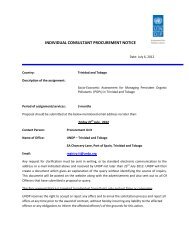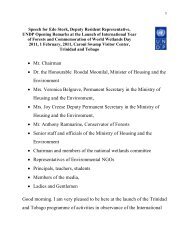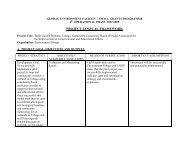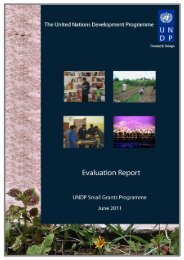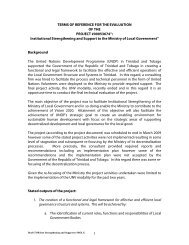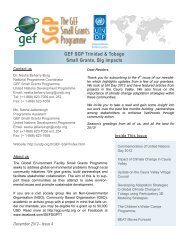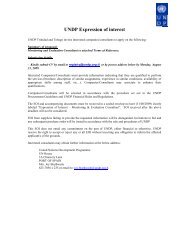The View from the Boardroom - UNDP Trinidad and Tobago
The View from the Boardroom - UNDP Trinidad and Tobago
The View from the Boardroom - UNDP Trinidad and Tobago
Create successful ePaper yourself
Turn your PDF publications into a flip-book with our unique Google optimized e-Paper software.
<strong>The</strong> <strong>View</strong> <strong>from</strong> <strong>the</strong> <strong>Boardroom</strong> - CEO Study on Corporate Social Responsibility in <strong>Trinidad</strong> <strong>and</strong> <strong>Tobago</strong>CHAPTER 1CSR in <strong>Trinidad</strong> <strong>and</strong> <strong>Tobago</strong> – Strategic Evolution or Preserving <strong>the</strong> Status Quo?“We have a fairly rigorouspre-qualification process.We certainly do a lot inensuring that our goodssuppliers <strong>and</strong> our serviceproviders meet certainst<strong>and</strong>ards or o<strong>the</strong>rwise<strong>the</strong>y won’t do businesswith us. We have clearlydefined business ethics,we have declarations thatsuppliers have to make,we do investigations onour own depending on<strong>the</strong> contractor or serviceprovider that we aredealing with.”Eugen Tiah, CEOPhoenix Park Gas ProcessorsLtd.For some industries such as <strong>the</strong>financial services sector, an importantaspect of CSR-driven compensation is<strong>the</strong> area of risk management <strong>and</strong> itsimplications for potentially damagingeffects on corporate reputation. <strong>The</strong>development of CSR-specific keyShould CSR be practised throughout <strong>the</strong> entiresupply chain?2.9%97.1%YesNoperformance indicators (KPIs) in thisarea could serve as an example for o<strong>the</strong>rindustries to integrate CSR targets intoindividual performance assessments,something that requires <strong>the</strong> settingof measurable targets. Companiesthat practise strategic CSR areperceptible to <strong>the</strong> dynamics, dem<strong>and</strong>s<strong>and</strong> pressures generated throughout<strong>the</strong> entire supply chain. In <strong>the</strong> wordsof Berry Ferdin<strong>and</strong>, ManagingDirector of Bewil & Company Ltd,his own business ethics was cruciallyinformed by a change of thinking <strong>and</strong>entrepreneurial practise on <strong>the</strong> part ofhis supply chain environment <strong>and</strong> hisbusiness partners: “We were involvedin <strong>the</strong> representation of companiesthat dem<strong>and</strong>ed that we took note of all<strong>the</strong> CSR-specific requirements in <strong>the</strong>marketplace. <strong>The</strong> whole l<strong>and</strong>scape interms of supplying services changed<strong>and</strong> our business partners dem<strong>and</strong>edthat we pay a little more attentionto things like staff welfare or that wepay attention to <strong>the</strong> environment. Sogradually we learned that to stay inbusiness you needed to fall in line <strong>and</strong>you also needed to be concerned abouta little bit more than just profits”.97.1% of all CEOs interviewed went onrecord as saying that CSR should bepractised throughout <strong>the</strong> entire supplychain. <strong>The</strong> latter enables businessowners, managers <strong>and</strong> boards to setsocial <strong>and</strong> environmental st<strong>and</strong>ardsfor external actors dem<strong>and</strong>ingthat suppliers are in compliancewith regulatory frameworks, goodbusiness practices <strong>and</strong> internationallyagreed industrial relations regimes.At <strong>the</strong> same time, supply chainsprovide interest groups <strong>and</strong> activistmovements with an entry pointfor scrutinising especially globallyoperating businesses <strong>and</strong> <strong>the</strong>irprofessed sustainability commitmentsthus contributing towards corporateaccountability. Critics would arguethat in <strong>the</strong> past, such scrutinyhas engendered “negative publicsentiments <strong>and</strong> invariably resentmentstowards […] global br<strong>and</strong>s following‘irresponsible’ behaviour along <strong>the</strong>irsupply chain” 19 <strong>and</strong> that companiescannot necessarily be held responsibleIs your company seeking to implementsustainability criteria throughout its supply chain?46.9%53.1%YesNo19 Kenneth Ameshi, Onyeka Kingsley Osuji, Paul Nnodim, ‘Corporate Social Responsibility in Supply Chains of Global Br<strong>and</strong>s: A Boundaryless Responsibility? Clarifications, Exceptions <strong>and</strong>Implications, in: Journal of Business Ethics, Vol. 81, No.1, p.226.26




